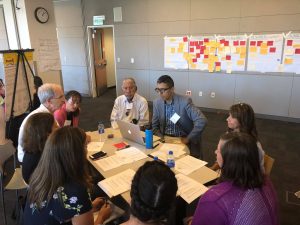summit
Power Sharing and Equity

Are you listening? How? And to whom? I share these questions as ones I’ve asked myself as both a philanthropist and an artist. I share these questions as the spark that I believe can ignite a shift in philanthropy that will transform our approaches and our impact.
This month, I led a small group conversation at the First Principles Forum, sharing what I’ve learned about investing in BIPOC (Black, Indigenous, and people of color) and Latinx communities. Our conversation centered around the need for advocates for underinvested and underrepresented groups to authentically understand and challenge the power dynamics that shape the many inequities in our society today.
We are living in a time when corporations and foundations are giving at truly remarkable rates, and influential philanthropists are directing their assets toward solving some of the world’s most complex problems. And yet, Latinx and other BIPOC communities, institutions, and leaders continue to experience significant relative hardships in areas ranging from education and employment to health and housing.
In 2001, my parents, Al and Carmen Castellano, won the California Lottery. With the proceeds, they established the Castellano Family Foundation. My parents had been activists and community organizers their entire lives, and they brought the same authentic engagement and listening to their philanthropic approach. Their legacy and leadership continue to inform our Foundation’s values and approach and my personal relationship with philanthropy.
Under-resourcing and under-representation in philanthropy and commerce amplify lingering inequities across our social and economic landscape. Latinx and other BIPOC nonprofits in particular report feeling undervalued by philanthropy, over-taxed by the demand for their services to communities in need, and largely invisible and irrelevant when it comes to new wealth donors.
For philanthropists to make the kind of lasting impact we envision, we need to more authentically prioritize listening to the people we seek to support. Giving is nothing without empathy, and we cannot hope to help anyone without taking the time to understand the reality they are living. Drawing on the example my parents set and the research our foundation has led, I am working to confront the implicit power imbalance that we bring to every interaction with a grantee or potential partner.
By acknowledging and consciously seeking out opportunities to share the power we hold, by talking less and listening with an open heart, we can reshape philanthropy. Listening comes before leading. Until we figure out how to step away from our power and consistently invest in the leadership of those most proximate to the challenges, we cannot possibly have the kind of lasting impact we seek.
Empathy is the root of philanthropy. We choose to invest in our communities because we are all connected, because we understand just how much we have in common with those who happen to have missed out on the kinds of legacies or windfalls that brought us to this place of wealth and privilege. We all share a common bond of humanity, and yet there is so much that separates the philanthropic community from the people we seek to support.
I think one experience that has most helped me to better understand the complexity of the power dynamics that undermine philanthropic impact is ultimately rooted in equity. More often than not, I am the only Latinx philanthropist, the only person of color, in the room. There are times when the weight of responsibility in representing all people who look like me in a space where my perspectives are unfamiliar is staggeringly heavy and frankly impossible. Hard as I might try, I will never hold enough wisdom and experience to understand and represent the diversity and complexity of BIPOC communities.
I can, however, work to speak my truth and share my experiences. I can embrace the opportunity to open up and engage with confidence, and I can encourage my fellow philanthropists to listen to different perspectives and power structures even when I am the only non-white person in the room. And I believe that if we all put in the effort to seek out uncomfortable and unfamiliar perspectives, to listen deeply and earn the trust of those who live injustice daily, we will reshape philanthropy for a more just and equitable future.
